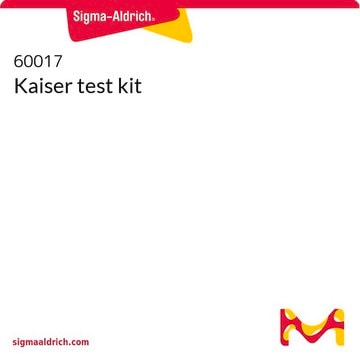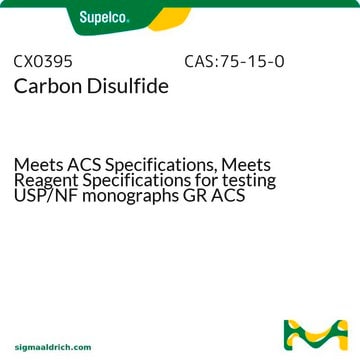180173
Disulfuro de carbono
ACS reagent, ≥99.9%
About This Item
Productos recomendados
grade
ACS reagent
Quality Level
vapor density
2.67 (vs air)
vapor pressure
5.83 psi
assay
≥99.9%
form
liquid
autoignition temp.
212 °F
expl. lim.
50 %
impurities
H2S, passes test (lim. ~1.5 ppm)
SO2, passes test (lim ~2.5 ppm)
≤0.05% water
evapn. residue
≤0.002%
color
APHA: ≤10
refractive index
n20/D 1.627 (lit.)
bp
46 °C (lit.)
mp
−112-−111 °C (lit.)
density
1.266 g/mL at 25 °C (lit.)
SMILES string
S=C=S
InChI
1S/CS2/c2-1-3
InChI key
QGJOPFRUJISHPQ-UHFFFAOYSA-N
¿Está buscando productos similares? Visita Guía de comparación de productos
Categorías relacionadas
General description
Application
It may be used in the preparation of dibenzyl trithiocarbonate, a RAFT (Reversible Addition-Fragmentation Transfer) chain-transfer agent (CTA). It may be employed as a solvent in the preparation of benzyl chlorodithioformate.
Packaging
related product
signalword
Danger
Hazard Classifications
Acute Tox. 4 Inhalation - Eye Irrit. 2 - Flam. Liq. 2 - Repr. 2 - Skin Irrit. 2 - STOT RE 1
target_organs
Peripheral nervous system,Central nervous system,Cardio-vascular system,Eyes
Storage Class
3 - Flammable liquids
wgk_germany
WGK 2
flash_point_f
-22.0 °F - closed cup
flash_point_c
-30 °C - closed cup
Elija entre una de las versiones más recientes:
¿Ya tiene este producto?
Encuentre la documentación para los productos que ha comprado recientemente en la Biblioteca de documentos.
Los clientes también vieron
Nuestro equipo de científicos tiene experiencia en todas las áreas de investigación: Ciencias de la vida, Ciencia de los materiales, Síntesis química, Cromatografía, Analítica y muchas otras.
Póngase en contacto con el Servicio técnico







